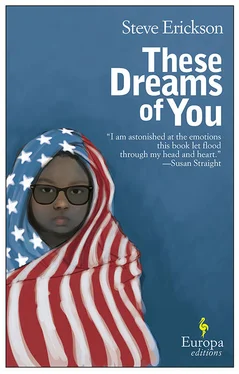An anti-Stalinist, Trotsky-estranged Marxist, Hale was a dedicated outsider wary of being any movement’s flunky, and though Zan didn’t share the professor’s politics, the iconoclasm was irresistible. Zan saw in the mentor another odd man out; it’s possible Hale saw in a protégé the same thing.
Another story about Hale, less reliable than the one concerning Trotsky, was that he was Billie Holiday’s lover in the mid-Forties when he worked on his first book, a ghostwritten autobiography of a white sax player and clarinetist of middling stature who dealt drugs, mostly marijuana, to other musicians including Holiday. Hale never disputed or discussed this rumor about him and Holiday, maybe out of sheer gentlemanliness, if it was true, or because he knew a great piece of public relations, if it wasn’t.
One afternoon the presidential candidate Zan had written about for the university newspaper made a campaign stop at the campus. Zan never had seen close up someone who might become president. The day was ravishing: fluttery and saturated with itself in the way that days were back then; but Zan had no sense until later how unusual the afternoon was.
There was a frenzy about the campaign for this candidate that Zan wouldn’t see again until forty years later, in the campaign of the man whose election and appearance in Chicago Zan watched that November night with Sheba sitting on his lap. It was a frenzy not simply of hope but yearning so desperate as to be hysteria, and that afternoon in the campus quad it seemed to him the crowd might devour the candidate, a slight man whose frailness conveyed less strength than an impossible, even irrational courage, inspiring in the crowd a savagery that was tender but savage nonetheless. The candidate and crowd shared an appetite for sacrifice and would make a ritual of it.
Zan got close to where the man stood. Was it on a platform? or in the back of an open car not unlike that in which the man’s brother had been shot? In any case, what Zan never forgot was the pain burning in the man’s gaze and the ecstasy — like he was Joan of Arc — of a crowd so increasingly unhinged that it wouldn’t have surprised Zan, wouldn’t have surprised anyone, had anyone told him or everyone else at that moment that within the month the man would be as dead as his brother.
Though in fact the maelstrom created by this candidacy had grown from the brother’s death a few years before, it was its own thing now, concurrent with the way this man became his own candidate. It was hard to know whether he would have become a great or disastrous president but it seemed inevitable to Zan that he would have been one or the other, poised as such men are at a tipping point. By the time the crowd tore the coat from the candidate’s back and plucked the cufflinks from his wrists, it so had lost control that craziness found a gravity and vortex, catching Zan in the undertow around his ankles.
He felt his feet lifted off the ground and the rest of him pulled under. Enveloped by panic, flailing wildly and reaching for anything he could grab, Zan called for help but the noise and movement were too much for anyone to hear or reach him.
Then, as he was swallowed by the crowd to be trampled or crushed underfoot, a hand, young and female and black, reached to him from the sky and he took it.
Now in the novel that Zan writes about the writer dying in the streets of Berlin, the black teenage witness to the beating kneels clutching her belongings, hears the music coming out of herself and, as she bends to touch the man’s body, is so startled when he stirs that she jumps back.
Dropping by the man’s side her old battered paperback, she flees into the mouth of the U-Bahn and only when the train arrives that will safely take her away from what’s just happened does she realize the book is missing. Because it’s a book that she’s had since she was a child, she seriously considers going back; but of course she can’t go back. The skinheads might return, the police might come, or the dying man in the street might rouse himself to consciousness and strike out at her in a rush of adrenaline.
No, she concludes, she can’t go back. The book is one of life’s markers now, one of experience’s receipts destined to disappear one day, and now on this night it has, in this way. So she steps onto the train and is swept to the sanctuary of Berlin’s tunnels, before the last five minutes overwhelm her like a wave.
She’s black, Zan decides once and for all, pushing the laptop away. Fuck whether I have the right to make her so. My imagination gives me the right. Hearing a Ray Charles record when I was Parker’s age may not mean I know anything but it means that I can imagine something I wouldn’t have imagined otherwise. It’s a little like what Descartes said about God, that the fact men can imagine a god proves there must be one.
Viv receives an email from the Ethiopian journalist she hired. Hello Viv , it reads, this is to inform you that I have at once uncovered a most tantalizing lead and also confronted an unexpected obstacle in our search for Zema’s mother. Since we believe she was Muslim it narrows my investigation to suggest one of two different women, the first with family heritage in Oromia to the south and the other with no family in Ethiopia and who in fact may have grown up not in this country but somewhere in Eastern Europe and then immigrated. Of course few people who I meet are very willing to talk and the closer I come to answers then the more silent that people become but I persist and press on and hope to have more news soon.
For months the new president is the only thing that makes Zan happy, the only thing that interrupts the billowing gloom of his life. At the moment it doesn’t matter if this is delusion. By now Zan knows better than to place hope in any one thing or person; it may be that the fact of this particular presidency rather than its occupant is what cheers him, because it signals the existence of the politically miraculous. Zan also has identified the connection between the candidate of forty years ago whom he saw in the campus quad, whose presence ripped the fabric of the collective rationale to reveal behind it a national delirium, and this current man with so many parts of the country making up his form.
There has followed the new president’s election a mini-Era of Good Feelings, remarkable for the overwhelming sense of national crisis with which the feeling coexists. Zan finds the hysteria for the new president at once inspiring and unsettling, since it’s as unsustainable by the public as it is by the man himself.
Not everyone shares such sentiment. Skepticism crosses political and philosophical lines. I heartily dislike him , writes a good friend, an anarcho-syndicalist who lives in the Texas Panhandle. I never did and never can trust him. A prima donna with that damned smile I can’t look at and all his round-the-world photo ops who nonetheless is unwilling to make people afraid of him — the worst of both worlds. He’ll never be worth a shit.
Viv receives another email that is both exciting and disconcerting. Hello Viv , it reads, I am writing to alert you in regards to the search for Zema’s mother that the trail of the woman in Oromia has led to nothing but that I believe I draw closer to the other woman who is indicated to originally be from Czechoslovakia or Poland or Germany — perhaps you might contact the aunt and grandmother to see if at least they will confirm this? — and now may be here in Addis closer than we ever suspected, within a mere few kilometers of Zema’s orphanage. I hope to deliver good news soon.
Читать дальше











